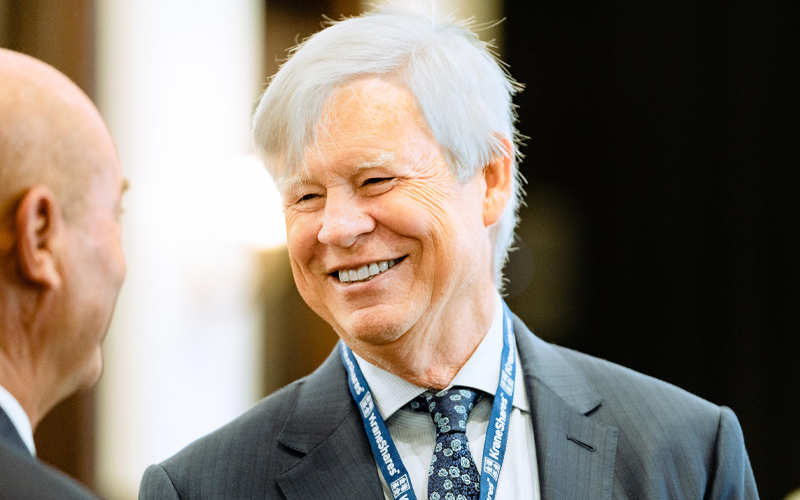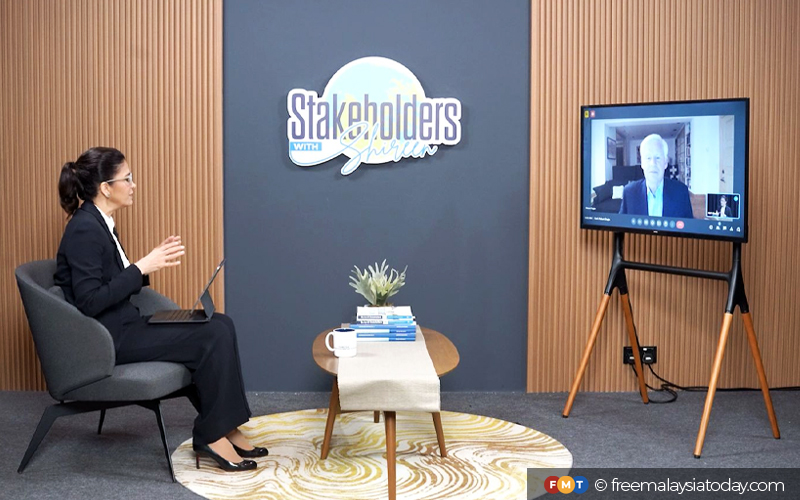
A world-renowned economist and statistician has warned that the global move towards cleaner energy to mitigate climate risk and manage sustainability expectations may see entities and economies that rely on fossil fuels facing “termination risk”.
“This is a risk that a company would face in the not too distant future if business was really going to disappear,” Nobel laureate Robert Engle explained in a recent interview on FMT’s talk show Stakeholders, with Shireen.
Engle was awarded the 2003 Nobel Memorial Prize in Economic Sciences for his methods of analysing economic time series with time-varying volatility. He is a professor emeritus in finance at NYU Stern and a co-director of its Volatility and Risk Institute (VRI).
Speaking to host Shireen Muhiudeen, he said despite high energy prices and strong earnings, the price-earnings ratio of energy companies remains low.
Engle said the net income and profitability of these companies could appear high due to strong demand and reduced supply, as well as a conscious choice to underinvest and slow down expansion due to global pressures to transition away from fossil fuels.
“This kind of termination risk is actually driving asset prices today in a way which makes energy prices and earnings high, but it is still leading to a termination point.
“If energy CEOs look at the net zero commitments that have been made (at COP 21) in Paris and are being made and restated in Dubai at COP 28, they must see that this (termination risk) is a real possibility,” he said.
Engle said termination risk is equally applicable to countries with a dominant fossil energy sector like the oil-rich Middle East states.
That risk, he said, has seen economies such as Saudi Arabia and Qatar using wealth acquired from fossil fuel energy to diversify into other sectors, such as tourism, culture, sports and non-energy manufacturing.
Engle predicts that these countries could at some point emerge as major players in green energy and renewables.
“They are taking a very forward-looking view on this and I think this is why Dubai wanted to host the COP 28,” he explained.
In contrast, Engle said Russia, which also faces termination risk as an oil-rich economy, opted to invade Ukraine as a diversification strategy.
“Russia is trying to use this illegal, inhumane and inappropriate war to take over Ukraine, its grain growing capabilities, its natural resources and its productive population,” he said.
Engle cautions that the planet as whole also faces termination risk.
“There is a possibility that we will make the planet uninhabitable and it will be ‘termination time’ for the human race. When you plan for the future, you really have to take these kinds of risks into account.”
He called for all stakeholders to collaborate to meet net zero emission commitments by 2050 to mitigate against climate risks and abort termination risk.
Averting future financial crises

Engle also highlighted the need to reduce incentives for risk-taking among financial institutions and to improve risk management in order to lower the probability of future banking crises.
Banks may be incentivised to take excessive risks if they are confident of guarantees and bail-outs, or simply because they do not perceive the extent of the risks, he said, adding that risk management prior to the 2007-2008 financial crisis failed because risks were not being measured correctly and volatilities not accounted for.
“It is very important to base your risk measures on current estimates of what the risks are, and what they could be in the future.”
Engle explained that VRI created its Volatility Laboratory (V-Lab) during the 2007-2008 financial crisis to provide real time measurement, modelling and forecasting of financial volatility and correlations for a wide spectrum of assets.
V-Lab is a public site that provides data on between 10,000 to 15,000 assets pulled every day from stock, currency and commodity exchanges around the world.
“We update every day. Everything is current; we estimate these models every day,” he said.
V-Lab also carries out stress testing and scenario analysis, including measuring bank fragility and capitalisation needs in a systemic crisis.
“We would like to know if the stock market collapses like it did in 2008, will the banks be able to survive or would they have to raise new capital?”
V-Lab measures systemic risk using SRISK, a tool that estimates the expected capital shortfall of a financial firm in a potential future crisis.
“SRISK is one of the really useful products that came out of the financial crisis,” said Engel. He said the SRISK for Silicon Valley Bank was on the rise long before its spectacular collapse.
“These are tools that should help the banking sector police itself, and regulators to police them,” he said.
SRISK can also be utilised to assess if an economy can withstand large systemic risks and calculate the probability of a financial crisis.
Hedging climate risks
According to Engle, VRI expends much of its efforts on assessing climate risk, given that it is a “huge risk”.
Investors are advised to hold a climate-hedged portfolio, which would comprise both overweight assets, stocks and investments that are prepared for climate change, and underweight stocks which are not.
“This is a portfolio which will do better than the market if the climate gets really bad.”
Using SRISK data, VRI is able to calculate CRISK, which estimates how much capital a financial institution would need in the event of a climate disaster.
“At the moment, we see some places where there is a lot of CRISK.
“But in a lot of places, it is not too severe, (meaning) the banks are not too exposed to climate change. That is a good thing because if climate risk is a cause of the next financial crisis, that means we are just getting double jeopardy,” he said. -FMT


No comments:
Post a Comment
Note: Only a member of this blog may post a comment.